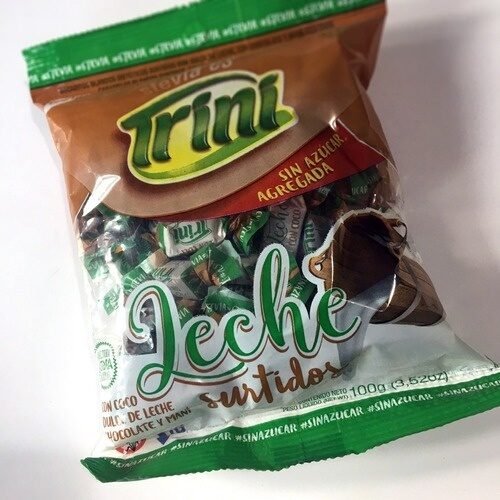Help us make food transparency the norm!
As a non-profit organization, we depend on your donations to continue informing consumers around the world about what they eat.
The food revolution starts with you!
Leche Surtidos - Trini - 100 g (3.52 oz)
Leche Surtidos - Trini - 100 g (3.52 oz)
Barcode: 7798134783007 (EAN / EAN-13)
Common name: bocaditos blandos dietéticos sutidos con dulce de leche, con chocolate y maní, con coco.
Quantity: 100 g (3.52 oz)
Brands: Trini
Categories: Snacks, Sweet snacks, Confectioneries, Specific products, Products for specific diets, Products without gluten, Caramels, Soft caramel candy
Labels, certifications, awards:
No gluten, No added sugar, es:Sin TACC
Origin of ingredients: Argentina
Manufacturing or processing places: Santa Fé, Argentina
Traceability code: RNE 21-004283, 080503190206, RNPA 21-112172
Link to the product page on the official site of the producer: https://www.steviatrini.com.ar/detallepr...
Stores: Sain
Matching with your preferences
Health
Ingredients
-
32 ingredients
: Dulce de Leche sin azúcar (Leche, emulsionante (Sorbitol), estabilizantes (Polidextrosa, Maltodextrina), edulcorante (Glicósidos de Steviol), Bicarbonato de Sodio, espesante (Carragenina), aromatizante (Esencia de Dulce de Leche), conservante (Sorbato de Potasio)), Polidextrosa, edulcorantes (Sorbitol en Polvo, Isomaltosa), Aceite Vegetal Hidrogenado, Maní Molido, Coco Rallado, Cacao en Polvo, espesante (Goma Arábiga), emulsionante (Monoesterato de Glicerilo), aromatizantes (Esencia de Dulce de leche, Esencia de Coco, Esencia de Chocolate).Allergens: Milk
Food processing
-
Ultra processed foods
Elements that indicate the product is in the 4 - Ultra processed food and drink products group:
- Additive: E407 - Carrageenan
- Additive: E414 - Acacia gum
- Additive: E420 - Sorbitol
- Ingredient: Emulsifier
- Ingredient: Flavouring
- Ingredient: Hydrogenated oil
- Ingredient: Maltodextrin
- Ingredient: Sweetener
- Ingredient: Thickener
Food products are classified into 4 groups according to their degree of processing:
- Unprocessed or minimally processed foods
- Processed culinary ingredients
- Processed foods
- Ultra processed foods
The determination of the group is based on the category of the product and on the ingredients it contains.
Additives
-
E1200 - Polydextrose
Polydextrose: Polydextrose is a synthetic polymer of glucose. It is a food ingredient classified as soluble fiber by the U.S. Food and Drug Administration -FDA- as well as Health Canada, as of April 2013. It is frequently used to increase the dietary fiber content of food, to replace sugar, and to reduce calories and fat content. It is a multi-purpose food ingredient synthesized from dextrose -glucose-, plus about 10 percent sorbitol and 1 percent citric acid. Its E number is E1200. The FDA approved it in 1981. It is 0.1 times as sweet as sugar.Source: Wikipedia
-
E202 - Potassium sorbate
Potassium sorbate (E202) is a synthetic food preservative commonly used to extend the shelf life of various food products.
It works by inhibiting the growth of molds, yeast, and some bacteria, preventing spoilage. When added to foods, it helps maintain their freshness and quality.
Some studies have shown that when combined with nitrites, potassium sorbate have genotoxic activity in vitro. However, potassium sorbate is generally recognized as safe (GRAS) by regulatory authorities.
-
E407 - Carrageenan
Carrageenan (E407), derived from red seaweed, is widely employed in the food industry as a gelling, thickening, and stabilizing agent, notably in dairy and meat products.
It can exist in various forms, each imparting distinct textural properties to food.
However, its degraded form, often referred to as poligeenan, has raised health concerns due to its potential inflammatory effects and its classification as a possible human carcinogen (Group 2B) by the International Agency for Research on Cancer (IARC).
Nevertheless, food-grade carrageenan has been deemed safe by various regulatory bodies when consumed in amounts typically found in food.
-
E414 - Acacia gum
Gum arabic: Gum arabic, also known as acacia gum, arabic gum, gum acacia, acacia, Senegal gum and Indian gum, and by other names, is a natural gum consisting of the hardened sap of various species of the acacia tree. Originally, gum arabic was collected from Acacia nilotica which was called the "gum arabic tree"; in the present day, gum arabic is collected from acacia species, predominantly Acacia senegal and Vachellia -Acacia- seyal; the term "gum arabic" does not indicate a particular botanical source. In a few cases so‐called "gum arabic" may not even have been collected from Acacia species, but may originate from Combretum, Albizia or some other genus. Producers harvest the gum commercially from wild trees, mostly in Sudan -80%- and throughout the Sahel, from Senegal to Somalia—though it is historically cultivated in Arabia and West Asia. Gum arabic is a complex mixture of glycoproteins and polysaccharides. It is the original source of the sugars arabinose and ribose, both of which were first discovered and isolated from it, and are named after it. Gum arabic is soluble in water. It is edible, and used primarily in the food industry as a stabilizer, with EU E number E414. Gum arabic is a key ingredient in traditional lithography and is used in printing, paint production, glue, cosmetics and various industrial applications, including viscosity control in inks and in textile industries, though less expensive materials compete with it for many of these roles. While gum arabic is now produced throughout the African Sahel, it is still harvested and used in the Middle East.Source: Wikipedia
-
E420 - Sorbitol
Sorbitol: Sorbitol --, less commonly known as glucitol --, is a sugar alcohol with a sweet taste which the human body metabolizes slowly. It can be obtained by reduction of glucose, which changes the aldehyde group to a hydroxyl group. Most sorbitol is made from corn syrup, but it is also found in nature, for example in apples, pears, peaches, and prunes. It is converted to fructose by sorbitol-6-phosphate 2-dehydrogenase. Sorbitol is an isomer of mannitol, another sugar alcohol; the two differ only in the orientation of the hydroxyl group on carbon 2. While similar, the two sugar alcohols have very different sources in nature, melting points, and uses.Source: Wikipedia
-
E500 - Sodium carbonates
Sodium carbonates (E500) are compounds commonly used in food preparation as leavening agents, helping baked goods rise by releasing carbon dioxide when they interact with acids.
Often found in baking soda, they regulate the pH of food, preventing it from becoming too acidic or too alkaline. In the culinary world, sodium carbonates can also enhance the texture and structure of foods, such as noodles, by modifying the gluten network.
Generally recognized as safe, sodium carbonates are non-toxic when consumed in typical amounts found in food.
-
E500ii - Sodium hydrogen carbonate
Sodium hydrogen carbonate, also known as E500ii, is a food additive commonly used as a leavening agent.
When added to recipes, it releases carbon dioxide gas upon exposure to heat or acids, causing dough to rise and resulting in a light, fluffy texture in baked goods.
It is generally recognized as safe (GRAS) by regulatory authorities when used in appropriate quantities and poses no significant health risks when consumed in typical food applications.
Ingredients analysis
-
May contain palm oil
Ingredients that may contain palm oil: Hydrogenated vegetable oil
-
Non-vegan
Non-vegan ingredients: MilkSome ingredients could not be recognized.
We need your help!
You can help us recognize more ingredients and better analyze the list of ingredients for this product and others:
- Edit this product page to correct spelling mistakes in the ingredients list, and/or to remove ingredients in other languages and sentences that are not related to the ingredients.
- Add new entries, synonyms or translations to our multilingual lists of ingredients, ingredient processing methods, and labels.
If you would like to help, join the #ingredients channel on our Slack discussion space and/or learn about ingredients analysis on our wiki. Thank you!
-
Vegetarian status unknown
Unrecognized ingredients: es:dulce-de-leche-sin-azucar, es:glicosidos-de-steviol, es:esencia-de-dulce-de-leche, Isomaltose, es:monoesterato-de-glicerilo, es:esencia-de-dulce-de-leche, es:esencia-de-coco, es:esencia-de-chocolateSome ingredients could not be recognized.
We need your help!
You can help us recognize more ingredients and better analyze the list of ingredients for this product and others:
- Edit this product page to correct spelling mistakes in the ingredients list, and/or to remove ingredients in other languages and sentences that are not related to the ingredients.
- Add new entries, synonyms or translations to our multilingual lists of ingredients, ingredient processing methods, and labels.
If you would like to help, join the #ingredients channel on our Slack discussion space and/or learn about ingredients analysis on our wiki. Thank you!
-
Details of the analysis of the ingredients
We need your help!
Some ingredients could not be recognized.
We need your help!
You can help us recognize more ingredients and better analyze the list of ingredients for this product and others:
- Edit this product page to correct spelling mistakes in the ingredients list, and/or to remove ingredients in other languages and sentences that are not related to the ingredients.
- Add new entries, synonyms or translations to our multilingual lists of ingredients, ingredient processing methods, and labels.
If you would like to help, join the #ingredients channel on our Slack discussion space and/or learn about ingredients analysis on our wiki. Thank you!
: Dulce de Leche sin azúcar (Leche, emulsionante (Sorbitol), estabilizantes (Polidextrosa, Maltodextrina), edulcorante (Glicósidos de Steviol), Bicarbonato de Sodio, espesante (Carragenina), aromatizante (Esencia de Dulce de Leche), conservante (Sorbato de Potasio)), Polidextrosa, edulcorantes (Sorbitol, Isomaltosa), Aceite Vegetal Hidrogenado, Maní, Coco, Cacao en Polvo, espesante (Goma Arábiga), emulsionante (Monoesterato de Glicerilo), aromatizantes (Esencia de Dulce de leche, Esencia de Coco, Esencia de Chocolate)- Dulce de Leche sin azúcar -> es:dulce-de-leche-sin-azucar - percent_min: 10 - percent_max: 100
- Leche -> en:milk - vegan: no - vegetarian: yes - ciqual_proxy_food_code: 19051 - percent_min: 1.25 - percent_max: 100
- emulsionante -> en:emulsifier - percent_min: 0 - percent_max: 50
- Sorbitol -> en:e420 - vegan: yes - vegetarian: yes - percent_min: 0 - percent_max: 50
- estabilizantes -> en:stabiliser - percent_min: 0 - percent_max: 33.3333333333333
- Polidextrosa -> en:e1200 - vegan: yes - vegetarian: yes - percent_min: 0 - percent_max: 33.3333333333333
- Maltodextrina -> en:maltodextrin - vegan: yes - vegetarian: yes - percent_min: 0 - percent_max: 16.6666666666667
- edulcorante -> en:sweetener - percent_min: 0 - percent_max: 25
- Glicósidos de Steviol -> es:glicosidos-de-steviol - percent_min: 0 - percent_max: 25
- Bicarbonato de Sodio -> en:e500ii - vegan: yes - vegetarian: yes - percent_min: 0 - percent_max: 20
- espesante -> en:thickener - percent_min: 0 - percent_max: 16.6666666666667
- Carragenina -> en:e407 - vegan: yes - vegetarian: yes - percent_min: 0 - percent_max: 16.6666666666667
- aromatizante -> en:flavouring - vegan: maybe - vegetarian: maybe - percent_min: 0 - percent_max: 5
- Esencia de Dulce de Leche -> es:esencia-de-dulce-de-leche - percent_min: 0 - percent_max: 5
- conservante -> en:preservative - percent_min: 0 - percent_max: 5
- Sorbato de Potasio -> en:e202 - vegan: yes - vegetarian: yes - percent_min: 0 - percent_max: 5
- Polidextrosa -> en:e1200 - vegan: yes - vegetarian: yes - percent_min: 0 - percent_max: 50
- edulcorantes -> en:sweetener - percent_min: 0 - percent_max: 33.3333333333333
- Sorbitol -> en:e420 - vegan: yes - vegetarian: yes - percent_min: 0 - percent_max: 33.3333333333333
- Isomaltosa -> en:isomaltose - percent_min: 0 - percent_max: 16.6666666666667
- Aceite Vegetal Hidrogenado -> en:hydrogenated-vegetable-oil - vegan: yes - vegetarian: yes - from_palm_oil: maybe - percent_min: 0 - percent_max: 25
- Maní -> en:peanut - vegan: yes - vegetarian: yes - ciqual_food_code: 15001 - percent_min: 0 - percent_max: 20
- Coco -> en:coconut - vegan: yes - vegetarian: yes - ciqual_proxy_food_code: 15006 - percent_min: 0 - percent_max: 16.6666666666667
- Cacao en Polvo -> en:cocoa-powder - vegan: yes - vegetarian: yes - ciqual_food_code: 18100 - percent_min: 0 - percent_max: 14.2857142857143
- espesante -> en:thickener - percent_min: 0 - percent_max: 12.5
- Goma Arábiga -> en:e414 - vegan: yes - vegetarian: yes - percent_min: 0 - percent_max: 12.5
- emulsionante -> en:emulsifier - percent_min: 0 - percent_max: 11.1111111111111
- Monoesterato de Glicerilo -> es:monoesterato-de-glicerilo - percent_min: 0 - percent_max: 11.1111111111111
- aromatizantes -> en:flavouring - vegan: maybe - vegetarian: maybe - percent_min: 0 - percent_max: 5
- Esencia de Dulce de leche -> es:esencia-de-dulce-de-leche - percent_min: 0 - percent_max: 5
- Esencia de Coco -> es:esencia-de-coco - percent_min: 0 - percent_max: 2.5
- Esencia de Chocolate -> es:esencia-de-chocolate - percent_min: 0 - percent_max: 1.66666666666667
Nutrition
-
Missing data to compute the Nutri-Score
Missing nutrition facts
⚠ ️The nutrition facts of the product must be specified in order to compute the Nutri-Score.Could you add the information needed to compute the Nutri-Score? Add nutrition facts
-
Nutrient levels
-
Fat in moderate quantity (12%)
What you need to know- A high consumption of fat, especially saturated fats, can raise cholesterol, which increases the risk of heart diseases.
Recommendation: Limit the consumption of fat and saturated fat- Choose products with lower fat and saturated fat content.
-
Saturated fat in high quantity (6.5%)
What you need to know- A high consumption of fat, especially saturated fats, can raise cholesterol, which increases the risk of heart diseases.
Recommendation: Limit the consumption of fat and saturated fat- Choose products with lower fat and saturated fat content.
-
Salt in low quantity (0.0912%)
What you need to know- A high consumption of salt (or sodium) can cause raised blood pressure, which can increase the risk of heart disease and stroke.
- Many people who have high blood pressure do not know it, as there are often no symptoms.
- Most people consume too much salt (on average 9 to 12 grams per day), around twice the recommended maximum level of intake.
Recommendation: Limit the consumption of salt and salted food- Reduce the quantity of salt used when cooking, and don't salt again at the table.
- Limit the consumption of salty snacks and choose products with lower salt content.
-
-
Nutrition facts
Nutrition facts As sold
for 100 g / 100 mlAs sold
per serving (7 caramelos 20 g)Compared to: Soft caramel candy Energy 1,088 kj
(260 kcal)218 kj
(52 kcal)-36% Fat 12 g 2.4 g +14% Saturated fat 6.5 g 1.3 g - Trans fat 0 g 0 g Carbohydrates 33 g 6.6 g -56% Sugars ? ? Polyols (sugar alcohols) 24.5 g 4.9 g Fiber 39.5 g 7.9 g +8,269% Proteins 4.5 g 0.9 g +89% Salt 0.091 g 0.018 g -81% Fruits‚ vegetables‚ nuts and rapeseed‚ walnut and olive oils (estimate from ingredients list analysis) 4.219 % 4.219 %
Environment
-
Eco-Score C - Moderate environmental impact
⚠ ️Select a country in order to include the full impact of transportation.The Eco-Score is an experimental score that summarizes the environmental impacts of food products.→ The Eco-Score was initially developped for France and it is being extended to other European countries. The Eco-Score formula is subject to change as it is regularly improved to make it more precise and better suited to each country.Life cycle analysis
-
Average impact of products of the same category: B (Score: 62/100)
Category: Soft caramel candy
Category: Soft caramel candy
- PEF environmental score: 0.41 (the lower the score, the lower the impact)
- including impact on climate change: 1.73 kg CO2 eq/kg of product
Stage Impact Agriculture
78.2 %Processing
10.7 %Packaging
5.5 %Transportation
4.5 %Distribution
1.1 %Consumption
0.0 %
Bonuses and maluses
-
Origins of ingredients with a high impact
Malus: -3
Environmental policy: -3
Transportation: 0
Origin of the product and/or its ingredients % of ingredients Impact Argentina 100 %High
-
Missing packaging information for this product
Malus: -15
⚠ ️ The information about the packaging of this product is not filled in.⚠ ️ For a more precise calculation of the Eco-Score, you can modify the product page and add them.
If you are the manufacturer of this product, you can send us the information with our free platform for producers.
Eco-Score for this product
-
Impact for this product: C (Score: 44/100)
Product: Leche Surtidos - Trini - 100 g (3.52 oz)
Life cycle analysis score: 62
Sum of bonuses and maluses: -18
Final score: 44/100
-
Carbon footprint
-
Equal to driving 0.9 km in a petrol car
173 g CO² per 100g of product
The carbon emission figure comes from ADEME's Agribalyse database, for the category: Soft caramel candy (Source: ADEME Agribalyse Database)
Stage Impact Agriculture
52.3 %Processing
19.5 %Packaging
15.7 %Transportation
11.6 %Distribution
1.0 %Consumption
0.0 %
Packaging
-
Missing packaging information for this product
⚠ ️ The information about the packaging of this product is not filled in.Take a photo of the recycling information Take a photo of the recycling information
Transportation
-
Origins of ingredients
Origins of ingredients with a high impact
Origin of the product and/or its ingredients % of ingredients Impact Argentina 100 %High
Report a problem
-
Incomplete or incorrect information?
Category, labels, ingredients, allergens, nutritional information, photos etc.
If the information does not match the information on the packaging, please complete or correct it. Open Food Facts is a collaborative database, and every contribution is useful for all.













